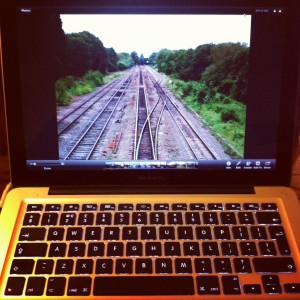I came across a recording recently of the composer Morton Feldman in conversation with the artist and composer John Cage in 1966. Feldman was complaining that when he went to the beach he suffered torments from innumerable transistor radios, blaring out rock and roll. Cage said he had experienced the same problem with radio noise in public spaces but that he had dealt with it the same way ‘primitive’ peoples had dealt with dangerous animals that threatened them, when they drew them on the walls of their caves. The way he did so was to compose a piece using transistor radios. Now, when he heard radios as background noise on the beach or elsewhere he just thought ‘they are playing my piece!’ and was then able to follow it and listen to it with pleasure.
Life’s a beach, or a bitch, depending on your state of mind: for the commuter on the early morning train it can be closer to the latter. Transistors in the sand are replaced with mobile ringtones,Tannoys announcing delays, the jostling and the overheard conversations of fellow passengers. And yet, through whatever complex combination of responsibilities, needs and desires, this is our fate and we must deal with it. We are the lungful of smoke the city breathes in and out, reduced in scale to corpuscles in the bloodstream that keeps its heart pumping.
For me the solution was a little like that proposed by Cage. My book Station to Station was written in response to an area of life that required a shift in perspective, like adjusting the dial on an old-school radio. Instead of seeing commuting in terms of stolen time to be drifted through in a coma I chose to see it as an opportunity. During the period of more than a decade I rode the train every day into London, a time during which I calculated I spent more than a year in motion, I wrote three books. It was probably inevitable my attention would turn eventually to the journey itself, a journey that had shaped my work, it’s rhythms imprinted through endless repetition as the timetables of the tides are on those who earn their living by the sea. Like Cage, once I focused on what was causing me a problem I became able to appreciate it.
Nevertheless, when my circumstances changed and I went freelance I imagined I would get far more writing done. The reverse was true. I missed my rolling office, my plastic desk with a view from the window blurred by speed, the sensation of velocity itself. That is when I approached First Great Western to find out whether they would allow me to return to the rails to complete my investigations. I wanted to begin a different journey, one on which I could descend from the train at whatever station I chose, to explore places I normally passed through at 120 miles an hour. They responded by making me their Writer on the Train, a mobile residency, the key to which was a pass to their network. The story had begun…


